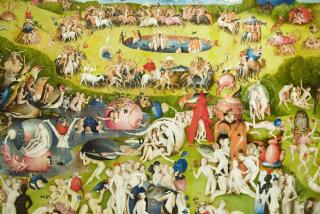Spinning perfectly out of control
THE SUMMER I TURNED 25, nature almost killed me. I was in the Badlands of South Dakota with my girlfriend, and one afternoon, we set out on a hike. The day was sere, sky blue and cloudless, the sun bright as a spotlight, beating with a relentless throb. Although the two of us had water, caps and sunscreen, the truth is we were worse than amateurs -- city kids without a clue.
We wandered along a low rocky trail and soon found ourselves in a territory as desolate as a moonscape, marked by sharp crags and edgy overhangs, without a hint of human life. One moment we left the trail to look at something -- what, exactly, I no longer recall -- and by the time we turned back, we were lost.
Iâve been thinking about that hike quite a bit of late, turning and re-turning it in my mind. Even after 18 years, it wants to tell me something, even provide a perspective on the world. Often we imagine nature as a set of postcards: glittery sunsets or sweeping desert vistas, panoramas with no substance, details with no teeth. Step off the trail, though, and nature turns on us, as we saw in the Indian Ocean last December, or in La Conchita a few weeks after that.
In the wake of disaster, people wonder how it can happen, what meaning can be ascribed to such accidents, whether God was paying attention or -- in the extreme -- has forsaken us. In Indonesia and Sri Lanka, people often described the devastation as apocalyptic, as if the alpha and the omega were somehow at play. Iâm as susceptible as anyone to such hyperbole, but I know it is as wrongheaded as it is human. Nature is eternal, implacable, impassive -- as unfathomable as a supernova. To believe a wrong turn in the Badlands has a larger meaning is to infer intention, that disaster sends a message of its own.
By a wrong turn, I donât mean disoriented, sidetracked, momentarily mistaken; I mean alone, in the middle of nowhere, with no clear path to the world. The hills, the brush, the dirt beneath our feet were strange and alien, and when we found what looked like a trail, it was merely the trace of an eroded streambed that led nowhere. For an hour or more, we trudged in ragged circles, finishing our water. The sun tracked us like a predator. We could have died.
Itâs a tempting fantasy, the fantasy of order and meaning; without it, we must stare down chaos, serendipity, the gut-chilling realization that we are adrift in a universe we canât explain. For if nature has an order, itâs an order that has nothing to do with us.
After the La Conchita landslide, some observers questioned the âarroganceâ of living in such an unstable area, while others discussed rebuilding as if anything less would be a retreat. Nature, however, cares for nothing. If we must label it, call it amoral and be willing to let it go at that.
For those who believe that nature exists at our mercy, know that it is the other way around. The day my girlfriend and I got lost in the Badlands, it wasnât a matter of being forsaken but bad luck, lack of preparation, our failure to take nature seriously. We know now that tens of thousands would have survived the tsunami had proper warning systems been in place, but such preparation begins with an acceptance that nature has its own imperatives, that, in a world in flux, the one thing we can count on is ephemerality.
I have a friend, a fairly religious man, who once told me he thought God could not exist without human beings. His comment came at the end of a night of drinking, but even so, I think he missed the point. No, it is not God who cannot exist without humanity, but humanity that cannot exist without God. God -- or at least our conception of God -- gives us a reason, a structure for all that we canât accept.
What if we found solace in the indifference of the world? Itâs not as big a stretch as it seems, for what is God but a metaphor for natureâs kinetic charge? Such a reality predates our existence, and it will linger after we are gone. On the surface, thatâs a terrifying notion, but look deeper, and it suggests a way to be enlarged.
Yes, nature is capricious; it is beautiful and dangerous, but most important, it is too complex to know. Still, if we acknowledge that it has its own dynamic, we will no longer see ourselves at its center or believe that every disaster holds a lesson of some kind. We will be free to make room for its contradictions, to see nature as it really is. We will be free, in other words, to accommodate its mysteries.
Late that afternoon in the Badlands, my girlfriend recognized a scrim of rock. We crept toward it, feeling both dread and anticipation which soon burst. On the other side, we discovered the trail unfurling like a lifeline, offering us a passage back from the abyss toward more familiar ground.
David L. Ulin is the author of âThe Myth of Solid Ground: Earthquakes, Prediction, and the Fault Line Between Reason and Faith.â
More to Read
Sign up for The Wild
Weâll help you find the best places to hike, bike and run, as well as the perfect silent spots for meditation and yoga.
You may occasionally receive promotional content from the Los Angeles Times.







